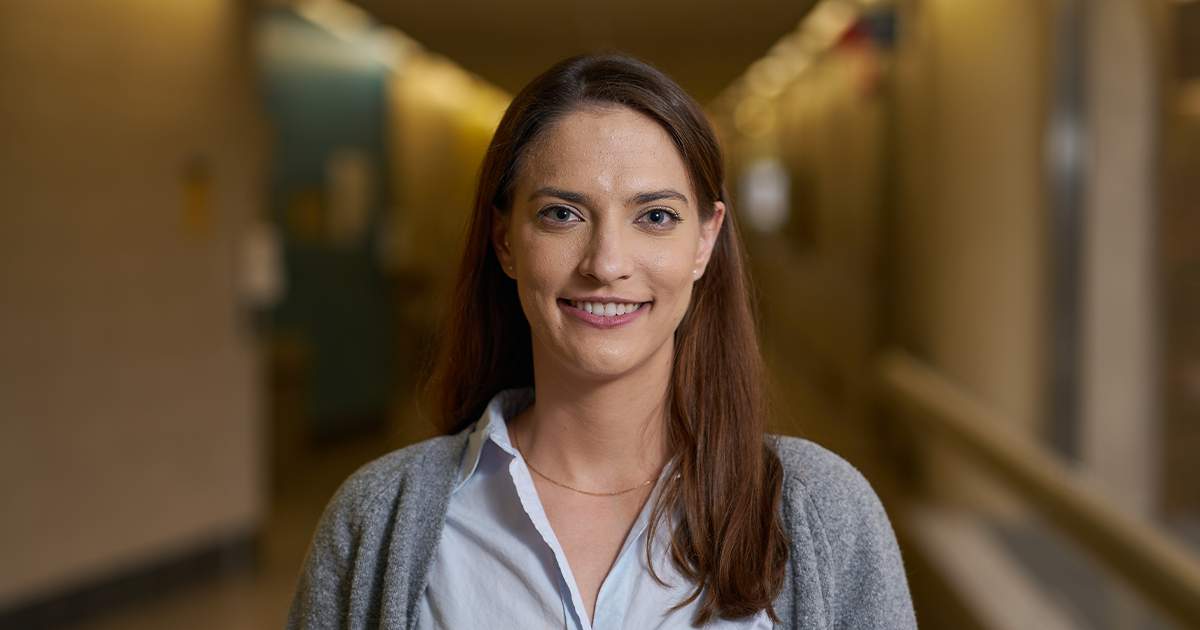La Salle University
La Salle psychology graduate student is first author on research study about autism
Researchers at CHOP’s Center for Autism Research studied the level of talkativeness of youth with autism compared to neurotypical peers when speaking with partners of different engagement levels.
A doctoral student at La Salle University working with the Center for Autism Research (CAR) at Children’s Hospital of Philadelphia (CHOP) is an author on several studies aiming to better understand autistic individuals’ responses in social interactions.
Meredith Cola, ’25, a native of Chester Springs, Pa., is a second-year student in La Salle’s Doctor of Psychology program. She decided to further her psychology education at La Salle because of what the program had to offer.
“Part of why I chose La Salle was the opportunity to complete the child-focused concentration within the Psy.D. program,” she said. “I was also interested in the opportunity to train with faculty in the Psy.D. program who had a specific focus on working with children—both from a clinical training and research perspectives. Finally, La Salle’s location in Philadelphia made it an ideal place to access externship training opportunities related to autism assessment and interventions.”
Cola’s work as a research assistant at CAR began after she completed her undergraduate degree at the University of Pennsylvania. She was drawn to the research because it combined clinical psychology and the opportunity to work with autistic individuals and their families.
“It was a nice intersection of those two interests,” she said.
In a recently published study (Autism Research, 2022), Cola and fellow researchers found that during experimentally manipulated conversations, children and teens with autism did not adjust their level of talkativeness to match quieter social partners, while neurotypical peers did. This could lead to less successful social interactions for autistic youth, the study concluded.
The study included 98 participants between the ages of seven and 17 years (48 who were diagnosed with autism and 50 who were neurotypical). Participants engaged in three-minute conversations with two novel social partners. The first partner acted interested in the conversation and talked more while the second partner acted bored and talked less.
As a group, neurotypical participants successfully adapted to their conversation partner’s behavior by being more talkative with the person acting interested and less talkative with the person acting bored. Meanwhile, the autistic group remained talkative in both settings and did not adapt their communicative behaviors to reflect their social partners.
Cola said this was studied through transcriptions of the conversations and looking at the number of words produced. And while the study results showed that as a group, autistic participants continued to talk more with less-talkative partners than neurotypical participants, there were some outliers observed. Notably, autistic girls were disproportionately represented in the most talkative subgroup.
The findings suggest that learning how to adjust one’s own level of talkativeness in response to social cues could be a growth opportunity for verbally fluent autistic individuals and a potential outcome measure for social communication interventions, according to the study.
Cola said this study is part of ongoing research at CAR focused on understanding and supporting social success in autistic people, particularly in the domains of speech and language.
“Part of why I chose La Salle was the opportunity to complete the child-focused concentration within the Psy.D. program. I was also interested in the opportunity to train with faculty in the Psy.D. program who had a specific focus on working with children—both from a clinical training and research perspectives. Finally, La Salle’s location in Philadelphia made it an ideal place to access externship training opportunities related to autism assessment and interventions.”
– Meredith Cola, ’25
While this study began prior to Cola’s time at La Salle, she said being enrolled at La Salle has opened more opportunities for collaboration especially with Sharon Lee Armstrong, Ph.D., associate professor and director of Psy.D. Research and Dissertations, associate faculty member at Rutgers University’s Center for Cognitive Science, adjunct scientist at Moss Rehabilitation Hospital, and research consultant in the Selective Mutism Research Institute; and Julia Parish-Morris, Ph.D., the study’s senior author, CAR scientist, faculty member of the Department of Biomedical and Health Informatics at CHOP, and Assistant Professor of Psychology at University of Pennsylvania. Cola is continuing her work with both Dr. Armstrong and Dr. Parish-Morris as part of her dissertation project.
“Cola came to La Salle and her dissertation project with substantial knowledge about autism and clinical assessment with autistic individuals,” Armstrong said. “Having worked previously at a university research lab she also brought statistical and research design sophistication as well as experience using a computerized text-analysis tool to study word usage. Cola’s dissertation project will build upon her previous research and enable her to expand understandings of sex differences in communication in the autistic population.”
As Cola progresses in her studies and moves onto a new site following graduation, she hopes to continue working in areas of clinical psychology that allow her to study topics related to neurodiverse individuals.
“I am really interested in continuing to work with folks with neurodevelopmental differences. One area of clinical and research interest that is particularly important to me is working to better understand and support autistic girls and women, because they have traditionally been underrepresented in research,” Cola said.
Ultimately, she hopes to work as a clinician at a university or academic hospital, providing high-quality assessment and intervention services for autistic individuals.
—Meg Ryan
